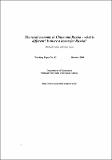| dc.contributor.author | Cuddy, Michael. | en |
| dc.contributor.author | Lijun, Qian. | en |
| dc.date.accessioned | 2010-05-11T14:08:29Z | en |
| dc.date.available | 2010-05-11T14:08:29Z | en |
| dc.date.issued | 2004 | en |
| dc.identifier.citation | Lijun, Q., Cuddy M., (2004) "The Rural Economy in China and Russia - What is Different? Is there a Lesson for Russia?" (Working Paper No. 0083) Department of Economics, National University of Ireland, Galway. | en |
| dc.identifier.uri | http://hdl.handle.net/10379/1009 | en |
| dc.description.abstract | A question frequently posed in Russia amid the economic and social anarchy of the
post socialist period is whether it might not be better off if it followed the Chinese
model of transition. This latter might be described in broad terms as a very slow
liberalisation of the political system with a certain devolution of decision-making
powers from the ¿centre¿ down to provincial and local levels while at the same time a
fairly rapid introduction of the capitalist model of privatisation and the market
economy.
The de facto situation on the ground with regard to the operation of market forces in
rural China and rural Russia today differs little in reality. However, the historic
evolution of institutional processes and relationships and the relative levels and
organisation of the production resources of land, labour and capital are very different
in rural China and rural Russia. Therefore, there are enormous differences in the
challenges faced in raising the level of value added per capita in these two rural
environments.
The paper presents the general political, administrative and economic context,
including the spatial differences, within which the rural economy operates in both
countries. The rural economy in both, including agriculture and non-agricultural
activity, are compared. The special role of the Town and Village Enterprises (TVE) in
China in invigorating the rural economy is analysed in detail, drawing in particular on
two contrasting Township case studies. The circumstances, which facilitated rural
development in China, do not exist in Russia.
The conclusion is that Russia has little to learn from the Chinese model of rural
development and must indeed develop its own model to address the current crisis in
the countryside and rural society. Nevertheless, one lesson is clear, the current crisis
in rural Russia can only be resolved with significant public sector intervention. | en |
| dc.format | application/pdf | en |
| dc.language.iso | en | en |
| dc.publisher | National University of Ireland, Galway | en |
| dc.relation.ispartofseries | Working Paper;No 0083 | en |
| dc.rights | Attribution-NonCommercial-NoDerivs 3.0 Ireland | |
| dc.rights.uri | https://creativecommons.org/licenses/by-nc-nd/3.0/ie/ | |
| dc.subject | Rural development, | en |
| dc.subject | China | en |
| dc.subject | Russia | en |
| dc.subject | Town and village enterprises | en |
| dc.subject | Rural development policy | en |
| dc.title | The Rural Economy in China and Russia - What is Different? Is there a Lesson for Russia? | en |
| dc.type | Working Paper | en |
| dc.description.peer-reviewed | peer-reviewed | en |
| nui.item.downloads | 759 | |


